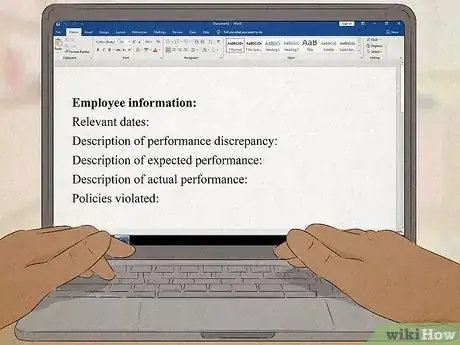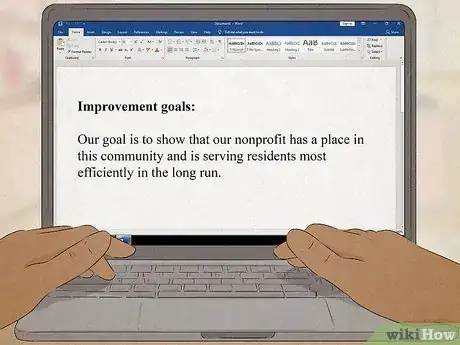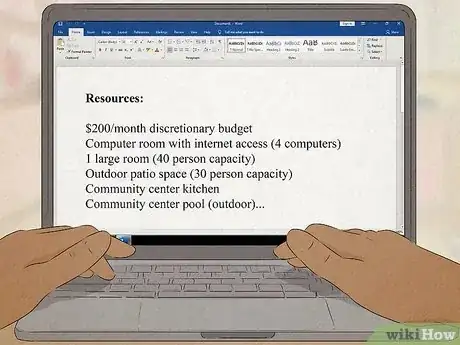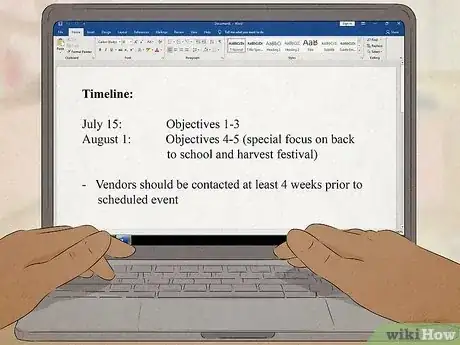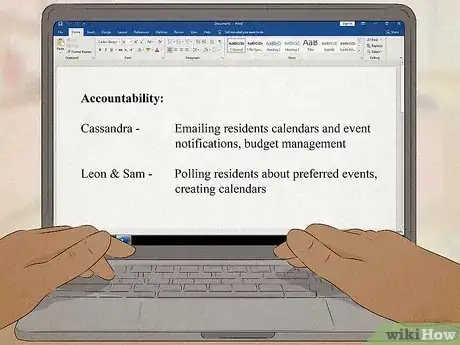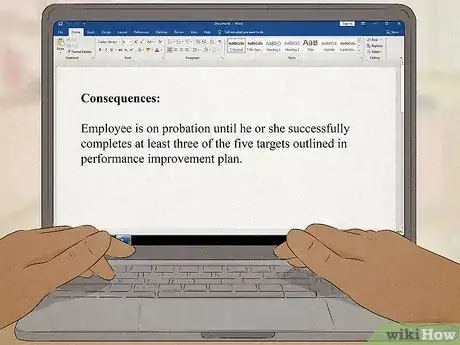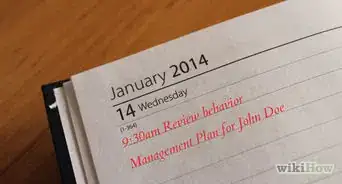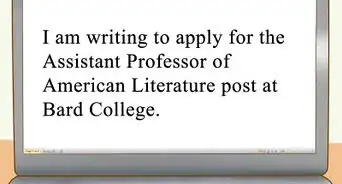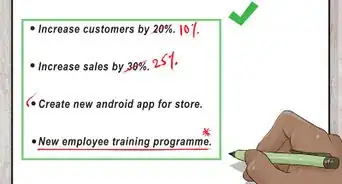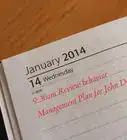This article was co-authored by Michael McCutcheon, PhD. Dr. Michael McCutcheon is a career coach, psychologist, and award-winning public speaker who specializes in procrastination elimination, goal achievement, and increasing life satisfaction. With a background as a counseling psychologist, he guides clients toward becoming more aware of their desires and anxieties to break old patterns, create new habits, and achieve life-changing results. He also helps clients improve organization skills, embark on a new career, get promoted, get admitted into graduate schools, and transition from school to the working world. He is a published author and lecturer in graduate psychology courses at New York University (NYU), a position he has twice won the Teaching Award (2014 & 2019). His work has appeared in the press as a lifestyle and career expert for The Washington Post/The Associated Press, The New York Post, Scholastic, Lifehacker, and The Coca-Cola Company. He has served as a contributing writer for Out Magazine and featured panelist on National Public Radio (NPR).
wikiHow marks an article as reader-approved once it receives enough positive feedback. In this case, 100% of readers who voted found the article helpful, earning it our reader-approved status.
This article has been viewed 177,969 times.
A performance improvement plan (PIP for short) is a standard tool to assist employees who are underperforming. The purpose of a performance improvement plan is to help an employee address and correct any issues in his or her work. As a supervisor, it's important to develop a performance improvement plan before taking disciplinary actions against an employee in order to include him or her in strategizing performance improvement.
Steps
Identifying The Problem(s)
-
1Document performance issues. Before putting an employee on a performance improvement plan, you need specific proof that he or she is underperforming on the job. Use information that is objective, factual, and detailed in documenting problems with an employee’s performance. It is generally considered best practice to use a consistent format in documentation of employee performance so that all employees are assessed fairly. Your documentation should include the following:
- Employee information (name, title, ID number if applicable, etc.)
- Relevant dates
- Description of performance discrepancy
- Description of expected performance
- Description of actual performance
- Any specific rules or policies that may have been violated [1]
-
2Talk to your employee about your concerns. Conduct a candid, face-to-face meeting with the employee in question to share the observed issues with his or her performance. Sharing your observations with your employee is important so that he or she understands your point of view, and acknowledges that there's a problem. Use your documentation to provide as much specific information to the employee as possible. Be objective, and don’t use inflammatory or accusatory language, so the employee doesn't feel attacked.Advertisement
-
3Highlight the ways in which your employee’s behavior deviates from the expected behavior. Let the employee know if he or she has committed a specific policy infraction, is not keeping up with work quotas, or simply not meeting the expectations of the position. Focus on the outcomes of the behavior rather than on the individual so that your employee sees how his or her behavior is affecting results on the job, or the workplace as a whole.
Developing An Action Plan
-
1Establish specific, measurable improvement goals for your employee.[4] Goals should be definitive and if possible, include numbers that can be measured later to assess progress effectively. Avoid generalizations or wording that can be interpreted several different ways. Specificity in improvement goals will prevent misunderstandings of expectations between you and your employee. Some examples of specific goals are:
- ”Employee will produce at least 150 units per month.”
- ”Employee will clock in for work no later than 9:00 a.m. every day.”
- "Employee will have no more than one calculation error per report.”
-
2Include a detailed list of available resources. Any resources that your employee has access to should be listed (and possibly explained). This helps you document that you've provided help for the employee and gives them an idea of the tools that can help him or her to improve. Make sure the employee is aware of these supports and how he or she should use them appropriately.
- These resources can include funds, training materials, time away from normal responsibilities, or other people’s time and expertise.
- For example, an employee who is struggling with time management could be given access to an administrative scheduling tool that helps organize and set time goals for work completed.
-
3Create a timeline to achieve performance improvement goals. This will keep the employee on track in achieving the goals in his or her plan to make steady progress toward overall performance improvement.
- State the start and end date in the employee's performance improvement plan, usually a 30-90 day period.
- Provide dates in between the start and end dates and identify benchmark goals to be met on those dates.
-
4Identify the metric that will be used to measure progress. To avoid any confusion on the part of the employee, be as specific as possible in how you will evaluate his or her progress toward achieving goals. Different goals will require different methods of measurement. For example, if improved attendance is the goal, state how you will keep track of an employee's attendance. Some examples are:
- "Employee will clock in using _______ computer software; supervisor will review attendance records on this program."
- "Employee will report to supervisor at the start of each work day."
-
5State the intended consequences following the completion of the performance improvement plan. Include the specific actions that you will take if the targets are met or unmet by the end of the performance improvement plan. Your employee should be made fully aware of what will happen when the plan ends, so that he or she knows what to expect in moving forward. Some examples of consequences include:
- "Employee is on probation until he or she successfully completes at least three of the five targets outlined in performance improvement plan."
- "Employment will be terminated if two or more targets outlined in performance improvement plan are not met."
- "Employee will be reassigned to the position of________if all targets outlined in performance improvement plan are not met."
-
6Review performance improvement plan with your employee. It's important to review a performance improvement plan thoroughly with your employee so that you both understand and feel comfortable with the terms of the plan. This is an agreement between two parties and can serve as a legal document in the future, if necessary.
- Provide the employee with a copy of the performance improvement plan.
- Verbally walk through each aspect of it with him or her.
- Allow the employee to respond and give feedback.
- Make any necessary adjustments to the plan to ensure it meets the needs of both parties.
- Get verbal affirmation from the employee that he or she fully comprehends the terms of the plan.
- Sign off on the plan with your employee to acknowledge its receipt and review.
Following Up
-
1Observe your employee and document progress. Using the metric established in the performance improvement plan, measure the employee’s progress toward meeting his or her targets, and document the progress as thoroughly as possible. This will provide you with objective evidence of the employee's progress and help in sharing useful feedback to your employee.
-
2Meet with your employee regularly to discuss progress. Establish regular follow-up meetings with the employee (daily, weekly, bi-weekly, monthly, etc.). This holds the employee accountable for improving his or her performance and can help him or her stay motivated and committed to achieving success. The object of these meetings is to help your employee succeed.
- Furnish feedback to the employee about his or her progression toward improvement goals.
- Allow the employee to ask questions, seek guidance, or request clarifications on performance objectives.
- Offer advice and suggestions to help the employee stay on track.
- Learn more about your employee to give you a better understanding of ways you can help him or her.
-
3Assess the effectiveness of the performance improvement plan. Decide if your employee is making reasonable growth with the performance improvement plan. If it's not working, decide if the shortcomings lie with the plan or with the employee. This will help you figure out how to move forward in dealing with the employee.[5] If the problems stem from the performance improvement plan, alter it to make the goals more attainable. Some questions to ask in evaluating a plan's effectiveness are:
- Does the timeframe need to be extended?
- Are the performance targets too difficult to attain?
- Were the results not completely within the employee’s control?
-
4Take action. If the performance improvement plan works, provide the employee with positive feedback, and if applicable, reward him or her in whatever way you outlined in the plan (i.e. coming off probation). If the plan does not succeed in improving performance, and you've ruled out deficiencies within the plan, take the actions outlined in your plan to proceed in the best interests of your organization.
Expert Q&A
Did you know you can get expert answers for this article?
Unlock expert answers by supporting wikiHow
-
QuestionHow do I choose reasonable goals for a performance improvement plan?
 Michael McCutcheon, PhDDr. Michael McCutcheon is a career coach, psychologist, and award-winning public speaker who specializes in procrastination elimination, goal achievement, and increasing life satisfaction. With a background as a counseling psychologist, he guides clients toward becoming more aware of their desires and anxieties to break old patterns, create new habits, and achieve life-changing results. He also helps clients improve organization skills, embark on a new career, get promoted, get admitted into graduate schools, and transition from school to the working world. He is a published author and lecturer in graduate psychology courses at New York University (NYU), a position he has twice won the Teaching Award (2014 & 2019). His work has appeared in the press as a lifestyle and career expert for The Washington Post/The Associated Press, The New York Post, Scholastic, Lifehacker, and The Coca-Cola Company. He has served as a contributing writer for Out Magazine and featured panelist on National Public Radio (NPR).
Michael McCutcheon, PhDDr. Michael McCutcheon is a career coach, psychologist, and award-winning public speaker who specializes in procrastination elimination, goal achievement, and increasing life satisfaction. With a background as a counseling psychologist, he guides clients toward becoming more aware of their desires and anxieties to break old patterns, create new habits, and achieve life-changing results. He also helps clients improve organization skills, embark on a new career, get promoted, get admitted into graduate schools, and transition from school to the working world. He is a published author and lecturer in graduate psychology courses at New York University (NYU), a position he has twice won the Teaching Award (2014 & 2019). His work has appeared in the press as a lifestyle and career expert for The Washington Post/The Associated Press, The New York Post, Scholastic, Lifehacker, and The Coca-Cola Company. He has served as a contributing writer for Out Magazine and featured panelist on National Public Radio (NPR).
Career Coach & Psychologist
-
QuestionWhat causes poor employee performance?
 Meredith Walters, MBAMeredith Walters is a Certified Career Coach who helps people develop the skills they need to find meaningful, fulfilling work. Meredith has over eight years of career and life coaching experience, including conducting training at Emory University's Goizueta School of Business and the US Peace Corps. She is a former Member of the Board of Directors of ICF-Georgia. She earned her coaching credentials from New Ventures West and a Master of Business Administration from the University of San Francisco.
Meredith Walters, MBAMeredith Walters is a Certified Career Coach who helps people develop the skills they need to find meaningful, fulfilling work. Meredith has over eight years of career and life coaching experience, including conducting training at Emory University's Goizueta School of Business and the US Peace Corps. She is a former Member of the Board of Directors of ICF-Georgia. She earned her coaching credentials from New Ventures West and a Master of Business Administration from the University of San Francisco.
Certified Career Coach
-
QuestionHow do you talk to an underperforming employee?
 Michael McCutcheon, PhDDr. Michael McCutcheon is a career coach, psychologist, and award-winning public speaker who specializes in procrastination elimination, goal achievement, and increasing life satisfaction. With a background as a counseling psychologist, he guides clients toward becoming more aware of their desires and anxieties to break old patterns, create new habits, and achieve life-changing results. He also helps clients improve organization skills, embark on a new career, get promoted, get admitted into graduate schools, and transition from school to the working world. He is a published author and lecturer in graduate psychology courses at New York University (NYU), a position he has twice won the Teaching Award (2014 & 2019). His work has appeared in the press as a lifestyle and career expert for The Washington Post/The Associated Press, The New York Post, Scholastic, Lifehacker, and The Coca-Cola Company. He has served as a contributing writer for Out Magazine and featured panelist on National Public Radio (NPR).
Michael McCutcheon, PhDDr. Michael McCutcheon is a career coach, psychologist, and award-winning public speaker who specializes in procrastination elimination, goal achievement, and increasing life satisfaction. With a background as a counseling psychologist, he guides clients toward becoming more aware of their desires and anxieties to break old patterns, create new habits, and achieve life-changing results. He also helps clients improve organization skills, embark on a new career, get promoted, get admitted into graduate schools, and transition from school to the working world. He is a published author and lecturer in graduate psychology courses at New York University (NYU), a position he has twice won the Teaching Award (2014 & 2019). His work has appeared in the press as a lifestyle and career expert for The Washington Post/The Associated Press, The New York Post, Scholastic, Lifehacker, and The Coca-Cola Company. He has served as a contributing writer for Out Magazine and featured panelist on National Public Radio (NPR).
Career Coach & Psychologist Keep your tone neutral and non-accusing. Ask them open-ended questions about what's going on in their life and work. Really listen to their responses, and try to keep an open mind. Don't make any assumptions because they may just be dealing with something in their personal life right now. Focus on helping them set future goals.
Keep your tone neutral and non-accusing. Ask them open-ended questions about what's going on in their life and work. Really listen to their responses, and try to keep an open mind. Don't make any assumptions because they may just be dealing with something in their personal life right now. Focus on helping them set future goals.
References
- ↑ http://hr.osu.edu/public/documents/policy/resources/perfimproveguide.pdf
- ↑ Michael McCutcheon, PhD. Career Coach & Psychologist. Expert Interview. 14 October 2020.
- ↑ Michael McCutcheon, PhD. Career Coach & Psychologist. Expert Interview. 14 October 2020.
- ↑ Michael McCutcheon, PhD. Career Coach & Psychologist. Expert Interview. 14 October 2020.
- ↑ http://www.trinet.com/blog/2015/02/17/effectively-managing-a-performance-improvement-plan/
- ↑ Michael McCutcheon, PhD. Career Coach & Psychologist. Expert Interview. 14 October 2020.
- ↑ Meredith Walters, MBA. Certified Career Coach. Expert Interview. 22 November 2019.
